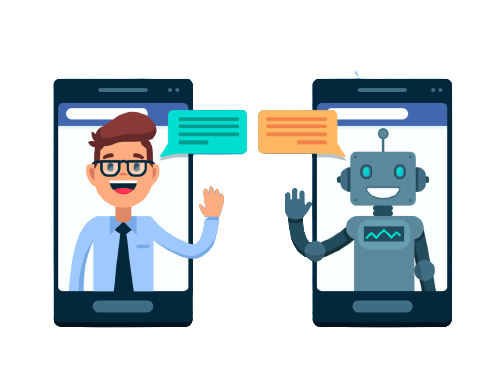In today’s fast-paced digital world, businesses are constantly seeking innovative ways to enhance their customer service while optimizing operational efficiency. One technology that has taken the B2B customer service realm by storm is chatbots. Specifically, we’ll delve into “Chatbots for Customer Experience,” exploring the benefits, advantages, and how they contribute to customer support automation.
Chatbots for Customer Experience: A Game Changer
The world of customer service is evolving, and chatbots are at the forefront of this revolution. “Chatbots for customer experience” is not just a buzzword but a strategic approach to deliver exceptional service. These intelligent virtual assistants have become indispensable for businesses, offering a myriad of advantages.
Benefits of Chatbots in Customer Service
With customers expecting prompt and efficient assistance, many companies are turning to chatbots to enhance their customer support operations. These AI-powered virtual assistants offer a multitude of benefits that not only streamline the customer service process but also improve overall customer satisfaction.
1. 24/7 Availability: Perhaps one of the most significant advantages of chatbots is their round-the-clock availability. Unlike human agents who require breaks and rest, chatbots are always “on duty.” This means that customers can get assistance at any time of the day or night, regardless of time zones or holidays. This accessibility is a game-changer for businesses serving a global customer base or those wanting to provide support outside regular business hours.
2. Instantaneous Responses: Chatbots excel at providing immediate responses to customer inquiries. When a customer has a question or problem, waiting on hold or for an email response can be frustrating. Chatbots eliminate this waiting time, delivering instant solutions. This not only reduces customer frustration but also enhances their perception of your brand’s responsiveness.
3. Cost-Efficiency: Implementing chatbots can lead to significant cost savings for businesses. Chatbots are capable of handling multiple customer inquiries simultaneously, reducing the need for a large customer support team. This cost-effective solution is particularly beneficial for small and medium-sized enterprises looking to optimize their resources.
4. Consistency: Chatbots ensure consistency in customer interactions. They deliver accurate and uniform responses to frequently asked questions, maintaining a unified brand voice across all touchpoints. This consistency helps reinforce your brand identity and ensures that customers receive reliable information every time they engage with your chatbot.
5. Scalability: As businesses grow, so do their customer service demands. Chatbots can easily scale to accommodate an increasing volume of customer inquiries without the need for extensive recruitment and training. This flexibility allows businesses to adapt to changing customer needs without sacrificing service quality.
6. Routine Task Automation: Chatbots excel at automating routine and repetitive tasks. They can handle tasks such as checking order status, updating contact information, or processing returns, allowing human agents to focus on more complex and nuanced customer issues. This not only boosts efficiency but also frees up human agents to provide more personalized support.
7. Data Retrieval: Chatbots can swiftly retrieve customer information and order history, providing agents with essential context during live interactions. This capability empowers agents to deliver a more personalized and efficient service, making customers feel valued and understood.
8. Proactive Engagement: Advanced chatbots can initiate conversations with customers based on predefined triggers. For example, they can send follow-up messages after a purchase, offer product recommendations, or assist with cart abandonment issues. This proactive approach enhances customer engagement and can drive additional sales and conversions.
Customer Support Automation with Chatbots
The automation capabilities of chatbots are a boon for B2B customer service. Here’s how they contribute to customer support automation:
1. Routine Task Automation: Chatbots excel at automating repetitive and mundane tasks, such as answering frequently asked questions, order status inquiries, and appointment scheduling. This allows human agents to dedicate their attention to more intricate matters.
2. Data Retrieval: Chatbots can swiftly retrieve customer information and order history, providing agents with essential context during live interactions.
3. Routing to Human Agents: When a query exceeds the chatbot’s capabilities, it can seamlessly transfer the conversation to a human agent, ensuring that complex issues receive the attention they require.
4. Proactive Engagement: Chatbots can initiate conversations with customers based on predefined triggers, such as cart abandonment or post-purchase follow-ups. This proactive approach enhances customer engagement.
Advantages of Chatbots in Customer Service
1. Improved Efficiency: Chatbots significantly reduce response times and resolution times, leading to enhanced efficiency in handling customer inquiries.
2. Personalization: Advanced chatbots leverage data to offer personalized recommendations and solutions, creating a more tailored customer experience.
3. Reduced Errors: Human errors are inevitable, but chatbots are consistent and accurate, minimizing the risk of incorrect information being conveyed to customers.
4. Scalable Support: Businesses can expand their customer support without proportionally increasing costs, making it easier to accommodate growth.
5. Enhanced Customer Satisfaction: The combination of instant responses, accuracy, and 24/7 availability ultimately leads to higher levels of customer satisfaction.
In conclusion, the rise of chatbots in B2B customer service, particularly in the context of “chatbots for customer experience,” is transforming the way businesses interact with their clients. These virtual assistants offer a range of benefits, including improved efficiency, cost savings, and the ability to provide consistent, personalized support. As customer expectations continue to evolve, chatbots are poised to play an even more prominent role in delivering exceptional B2B customer service. Embracing this technology is not just a trend but a strategic move to stay competitive in the modern business landscape.
